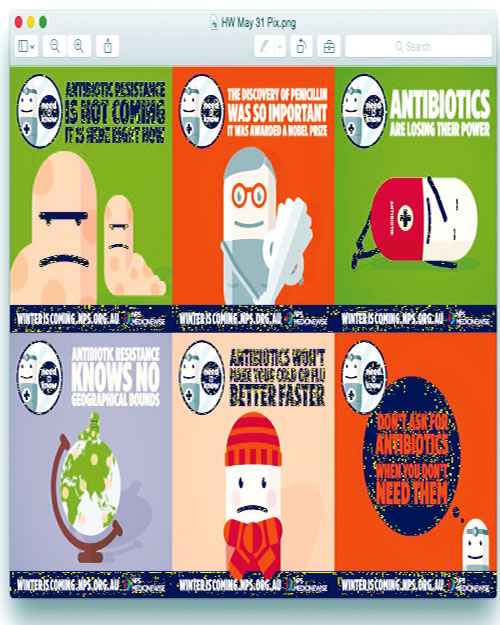Fight antimicrobial resistance, protect mothers and newborns
At a time when giant strides are being made in the treatment of diseases and infections, physicians, scientists, researchers and even the patients are worried that certain diseases are becoming resistant to a wide range of antimicrobial medicines.
Such diseases include bloodstream infections (sepsis), pneumonia, tuberculosis, HIV/AIDS, malaria, gonorrhea and urinary tract infections.
Should the microbial resistance continue, they say, it may result in complications of childbirth and infections in newborns.
Again, those who need to have hip and knee replacements, organ transplantation, chemotherapy for cancer, and many common surgical procedures risk morbidity.
According to trio of World Health Organisation, World Organisation for Animal Health and the Food & Agriculture Organisation of the United Nations, antimicrobial resistance will increase health care costs for individuals, health systems, and countries. People and society will suffer from lost wages and decreased productivity.
Worse still, they warn, antimicrobial resistance will kill millions of of people every year, with decreased food production, while our foods may generally become unsafe.
The experts state that “Antimicrobial resistance is a global threat that requires urgent development and action by governments and society as a whole. It threatens the achievements of modern medicine. Common infections and minor injuries that have been treatable for decades may once again kill millions.” Such is the concern!
Why antimicrobial resistance?
According to General Practitioner, Dr. Tinu Davis, the power of antibiotics has led people to abuse or misuse them.
“People take too many antibiotics for the wrong reasons. From buying them at pharmacies without doctor’s prescription, to eating them in animal protein such as beef, poultry and fish, human’s exposure to antibiotics has been limitless.
“People misuse antibiotics for viral infections such as colds and flu; while they are also used as growth promoters in animals, fish and plants.
“That is why resistance to common antibiotics in the treatment of even simple infections is becoming alarmingly common,” she says.
Experts say the more antibiotics are used, the more infectious agents are exposed to them and the quicker they become resistant and the drugs simply stop working.
Davis says drug-resistant microbes are found in people, animals, food and hospital environments; and they can spread between people and animals; and also from person to person
Worse, experts note, is the fact that no one is developing new antibiotics to replace those that are losing their potency. In fact, the WHO notes that no new classes of antibiotics have been developed in 40 years!
How does this affect new mothers and newborn babies?
Consultant Gynaecologist, Dr. Grace Emmanuel, says child delivery can be a risky time for mothers and babies because their immune systems are not at full strength and there is a much higher risk of getting sick, either from bugs that the mother is already carrying, or from the infections that mother or baby acquire in the hospital.
Experts say when hospitals lack toilets and water for washing, if they are overcrowded and unhygienic, the risks of infection are a lot higher.
It is estimated that globally, more than 30,000 women die annually as a result of severe infections when giving birth; while over 400,000 newborn babies get infected annually.
Not less than half of these infants — about 200,000 — die each year from infections that do not respond to available drugs, experts lament.
The World Health Organisation states that in hospitals where there is more risk of antibiotic-resistant bacteria in circulation, four out of every 10 newborns delivered in such environments develop severe infections that are resistant to standard treatments.
Premature babies are said to be at particular risks of severe illness and death from blood infections. Neonatal intensive care units suffer worse risks because of possible contamination with highly resistant strains of infections, WHO said.
“Antibiotic-resistant infections spread rapidly in overcrowded hospital nurseries, with poor hygiene and widespread antibiotic use,” WHO warns.
How can you help?
“The most important thing to do is to stop the spread of infection. This means that health care facilities should have basic water and sanitation services, and really good hygiene compliance,” Davis says.
She adds that hospitals should prevent overcrowding; while new mothers and their babies should not be kept in hospital any longer than necessary.
She also advises people to only use antibiotics when they are needed and only under the supervision of a competent physician.
Experts warn that it is estimated that less than half of the antibiotics taken by humans are actually needed; while its condemnable use in animals is even higher.
The WHO also counsels healthcare workers to always wash their hands at key moments; they must always wear gloves, and their equipment should be sterilised.
Again, WHO says, the delivery area should be clean, waste should be disposed safely, while contaminated laundry must be treated with care.
The bottom line: Don’t abuse antibiotics — or any drug for that matter.
PUNCH.








